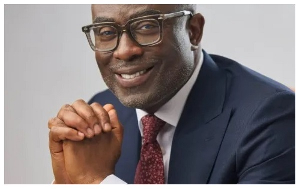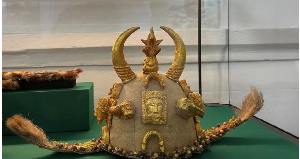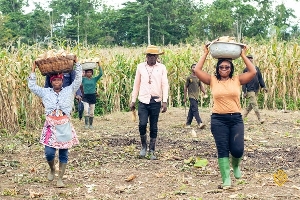- Home - News
- TWI News | TV
- Polls
- Year In Review
- News Archive
- Crime & Punishment
- Politics
- Regional
- Editorial
- Health
- Ghanaians Abroad
- Tabloid
- Africa
- Religion
- Election 2020
- Coronavirus
- News Videos | TV
- Photo Archives
- News Headlines
- Press Release
Editorial News of Thursday, 16 May 2002
Source: --
Boakye Djan ready for Reconciliation Commission
London (United Kingdom) 14 May 2002 - Major Kojo Boakye Djan has offered his contribution to the work of the National Reconciliation Commission in his double capacity as a fighter of unconstitutional governments both in and out of military service.
His double offer is contained in a statement he issued in London to The Crusading Guide on 10 May 2002 when contacted for his reaction to the inauguration of the National Reconciliation Commission recently. ?In my capacity as a key member of the AFRC, in fact, its Deputy Chairman and Official Spokesman, and as Chairman of the premier and overseas based Campaign for Democracy in Ghana from April 1982, I have a contribution to make to the work of the Commission on unconstitutional governments in Ghana.?
He emphasised that while the AFRC was directed at the sitting SMC II and the preceding NLC, NRC and SMC I unconstitutional governments, in 1979, the Campaign for Democracy in Ghana was the first exiled resistance movement overseas launched by him to fight the unconstitutional PNDC and its successor NDC on the same principles underlying the efforts of the AFRC.
Boakye Djan, the principal of Boakye Djan & Co., a firm of Public Policy Advisers, said he had instructed his solicitors to open contact with the Commission to make arrangements that ?will enable me to come home as soon as practicable to contribute to the work of the Commission in my two separate but closely related roles in fighting and resisting unconstitutional governments in Ghana.?
?The inauguration of the National Reconciliation Commission to begin its work in July this year, has come with both relief and excitement for me personally,? he declared in his statement. He then went on to provide the basis for his relief and excitement. A relief because as someone who advocated the formation of a Fact-Finding Commission as far back in 1980, ?it is a dream come true.?
?When I called for a Commission to examine the records of the AFRC first in February 1980 with one officer member of the AFRC (Major {rtd} Mensah Poku), and in July 1981 with another officer member (Capt {rtd} Baah-Acheamfour), the idea was dismissed outright by all parties with interest in the AFRC?, he recalled.
He claimed that the government of the day headed by Dr Limann, dismissed it as unworkable. ?Then the All People?s Party, a recently united front opposition party in Parliament, including the Popular Front Party, the immediate past predecessor of the New Patriotic Party, condemned it as an attempt to shore up the government in office.
The legal and judicial establishment ignored both warnings to them to stop putting at the affairs of the AFRC in courts and instead support my efforts to set up the Commission as the best way forward,? he noted. Boakye Djan wondered why some of his colleagues on the AFRC and its key supporters accused him and his two colleagues of initiating moves to erode the gains of June 4 with their probe call then.
He recalled that, ?almost 21 years to the day of our repeated call for its formation in July 1981, the Commission is now set to begin its work on July first this year,? and then took the opportunity in his statement to register his appreciation for the Kufuor-led administration that has made it all possible for the Commission to be set up.
Making a case that if the PNP government had heeded their calls to set up the Commission in 1980 and 1981, Ghana would almost certainly have avoided another unconstitutional government in the form of the PNDC in 1981 and all its consequences for us as a people. Boakye Djan expressed his amazement that, ?after missing the opportunity to lead the whole world in these efforts then, today we are even content to be hailed for following the lead of countries like South Africa, Peru, Chile, etc., which were then engrossed in their own internal conflicts when we called for the Commission here in Ghana, 21 years ago.
He switched on to the issue of his excitement at the prospects of the Commission beginning its work soon and after all these years. ?I cannot allow the difficulties that have caused its delayed formation to obscure my excitement today. We have the opportunity to negotiate a settlement of a major obstacle to our collective development as a nation and a people,? he said.
He reminded all that, ?nobody can deny that, right from the run-up to independence in 1957, through to today, Ghanaians as a people have been locked in a deadly and largely self-inflicted and politically induced conflicts: conflicts within and between individuals, families, tribes, religious, and public institutions.?
He attributed the slow down of our collective march to prosperity to these conflicts, and added: ?today, our country as a business entity, has literally been declared bankrupt and is in the receivership of the IMF, World Bank and others.?
Major Boakye Djan then wished the Commission well in his fervent hope that it will make an important contribution in removing this obstacle so that we shall live in peace with each other while developing in real democracy.
Reactions to his statement and support for the Commission were quite euphoric especially, in the exiled community in London. Mr Baffour Ankomah, the editor of New African, a London-based and leading African monthly magazine has this to say: ?Ghana will be better for it. He is the one person in Ghana who has worked so hard to give meaning to the justice part of our national motto: Freedom and Justice since 1979. He has done this with selfless, fearless and clinical efficiency. He is indeed the true justice warrior of our time.?
A Ghanaian Solicitor and an Immigration Law specialist who has worked closely with him said: ?The Commission will benefit immensely from his rich experience if it does not uphold the details over and above the principles of fighting unconstitutional governments in Ghana.? ? The Crusading Guide.










